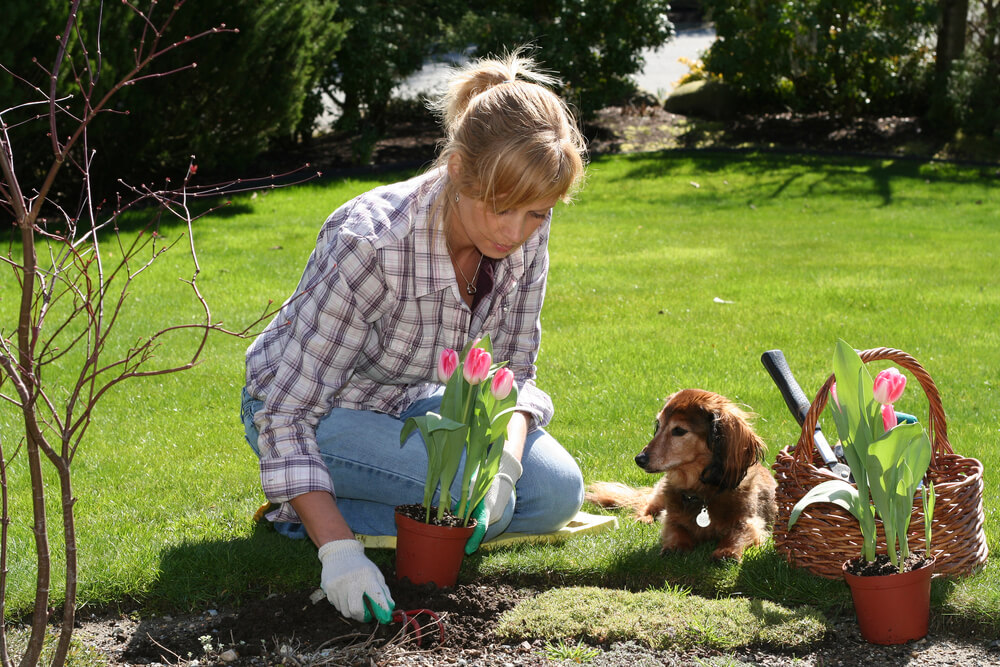With the COVID-19 threat and stay-at-home orders, your family has hopefully hunkered down, and is trying to avoid any unnecessary trips outside the house. Although they may be home more, people seem busier than ever, with teleworking, homeschooling children, and stocking up on essential groceries. A trip to the veterinarian for a pet emergency is not something you want to deal with right now, so take precautions to keep your furry friend safe. Follow our six tips to safeguard your home against a pet quarantine catastrophe.
#1: Don’t let your kids share snacks with your pet
Feeding your family three meals a day, not to mention snacks in between, adds up to a lot of food. Although you stocked up during your last shopping trip, you’re amazed how quickly your kids plow through the stockpile, and they likely seem to be eating a new snack every time you turn around. Many human foods that your kids might accidentally drop—and your pet may gobble up quickly—can cause a toxicity nightmare. For example, grapes, raisins, chocolate, and sugar-free gum are highly toxic to pets, and can cause significant illness, or death, if eaten off the floor or sneaked from a low table. So, restrict snack time to the kitchen, and confine your pet in her crate or another room until snacktime is over, and all food is cleaned up safely.
#2: Keep craft time contained
You have probably broken out piles of arts and crafts supplies, between school activities and boredom-beating craft projects. Supplies, such as glue, popsicle sticks, pom poms, and kinetic sand, can pose a risk to curious pets, who think craft time is snack time. Many adhesives can cause toxicity, pom poms can lead to a gastrointestinal (GI) obstruction, and popsicle sticks can splinter and puncture your pet’s stomach. Kinetic sand, which contains a bonding agent to make it self-sticking, can clump up in your pet’s intestines, and cause a life-threatening GI obstruction. Consider giving your pet a Kong filled with frozen peanut butter in a separate room during craft time, to keep her safely occupied.
#3: Store medications safely out of your pet’s reach
If you have stocked up on over-the-counter cold and flu medications and anti-inflammatories, in case a family member falls ill, keep them stored safely out of your pet’s reach. Many human medications, such as Tylenol (i.e., acetaminophen), Advil (i.e, ibuprofen), and Aleve (i.e., naproxen), are toxic to pets, and can cause life-threatening kidney failure, and other serious complications. Don’t think your pet would be tempted to eat a bottle of bitter pills? According to the ASPCA Animal Poison Control Center, human over-the-counter and prescription medications are the most common cause of pet toxicity, and account for one-third of their calls.
#4: Make cleaning time pet-free
If you are taking advantage of this time at home to get a jump on your spring cleaning, keep in mind that many cleaning chemicals can be poisonous to pets. Keep buckets of soapy water where your pet cannot take a drink, and let your clean floors dry before allowing your pet to walk on them. Never use cleaning products on your pet’s sensitive skin, as chemical burns can cause extensive skin damage.
#5: Keep your pet away from home improvement projects
Now is a great time to freshen up your living room paint or build that garden trellis you’ve always wanted; however, keep your pet away from home improvement zones. Pets are known to eat things, such as paint or heavy-duty Gorilla Glue, that can cause major problems. Pets may also knock over heavy tools or wood, and be significantly injured. While you are hard at work, let your pet relax in another room with her favorite toys and treats.
#6: Don’t let your pet help with yard work
Without spring sports to eat up your weekend time, you may have the greenest lawn and brightest blooms on your block this spring. But, before you head out to tackle yard and garden tasks, think about the products you use, and how they can affect your pet. Many yard and garden products can cause pet toxicity, such as:

- Fertilizers — Garden fertilizers, which are often made from animal products, such as bone or blood meal, can clump in your pet’s GI tract, and cause a blockage if she gets into the bag, or eats freshly laid garden fertilizer.
- Lawn treatments — Follow all package instructions regarding pet safety—most products must dry completely before pets can walk on them safely.
- Insecticides — Products formulated to kill lawn and garden pests can cause toxicity to your pet, as well. For example, metaldehyde used in slug and snail products can cause severe toxicity and death, if your pet eats bait you have spread around your prized roses.
- Flowers and plants — Cats, in particular, are attracted to greenery, and tend to chew on plants that may be toxic. The most dangerous plants include lilies, which can cause deadly kidney failure if only a small amount of flowers, leaves, or pollen is ingested.
We hope your stay-at-home time is productive. We know your pet is enjoying not being alone all day, but if she manages to get into something toxic when you turn your head for a few moments, contact the Holland Lake Animal Hospital team, and we can help.
